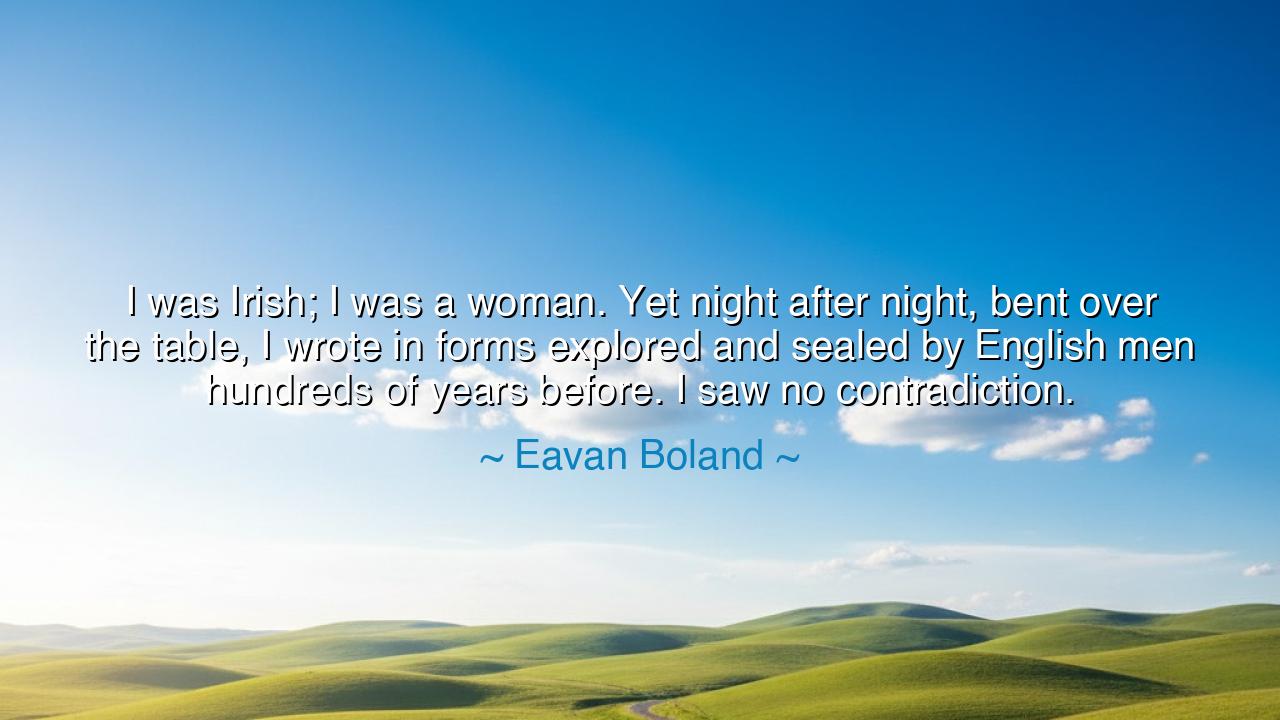
I was Irish; I was a woman. Yet night after night, bent over the
I was Irish; I was a woman. Yet night after night, bent over the table, I wrote in forms explored and sealed by English men hundreds of years before. I saw no contradiction.






Eavan Boland, poet of Ireland and keeper of memory, once declared with quiet strength: “I was Irish; I was a woman. Yet night after night, bent over the table, I wrote in forms explored and sealed by English men hundreds of years before. I saw no contradiction.” These words shine with paradox and defiance, for in them is contained the struggle of identity, of tradition, and of the eternal power of art. She acknowledges the weight of history—colonial, patriarchal, exclusionary—and yet affirms her right to claim it, to wield it, and to make it her own.
The meaning of this quote lies in the triumph of reclamation. For centuries, the structures of poetry—its sonnets, its elegies, its high forms—were shaped and guarded by the hand of English men, distant from the voice of the colonized and dismissive of women’s experience. To an Irish woman, especially in Boland’s time, these forms might have seemed foreign, even oppressive, reminders of domination and silencing. Yet she took them without apology. She bent over her desk and wrote, not as a trespasser but as one who knew that art, once created, belongs to all who dare to use it. In her pen there was no contradiction—only inheritance reclaimed.
The origin of this declaration can be traced to the cultural tensions of Ireland itself. A land scarred by colonization, its people long silenced or caricatured in English letters, Ireland bore the burden of asserting its own identity within the language of its oppressor. Boland, doubly marginalized as both Irish and woman, confronted a world in which the literary canon was built to exclude her. And yet, rather than retreat, she entered those forms, mastered them, and inscribed within them the truths of her people, her gender, her own life. Thus, the very tools of exclusion became her instruments of liberation.
History provides us with many such acts of reclamation. Consider Frederick Douglass, once enslaved, who mastered the English tongue of his oppressors and with it thundered against slavery itself. His speeches and writings shook nations, for he seized the very language meant to silence him and turned it into a weapon of truth. Or think of Phillis Wheatley, the African woman sold into bondage, who yet wrote poetry in the neoclassical forms of her captors, and in doing so proclaimed her humanity against every attempt to deny it. Boland stands in their lineage: those who take what was denied them and transform it into a vessel of power.
This quote also reveals a deeper truth about art itself: that its forms transcend ownership. The sonnet is not the property of English men, nor is epic the property of Greece, nor lyric the property of Rome. These are patterns of human expression, open to all who live and breathe. To believe otherwise is to shackle the imagination. Boland, by declaring she saw no contradiction, reminds us that the act of creation makes every artist a rightful heir to the treasury of human forms. The poet does not ask permission; the poet writes.
O children of tomorrow, let this lesson pierce your hearts: do not be deterred by those who say the traditions of art, science, or thought are not yours to inherit. If you are silenced because of your nation, your gender, your race, your class—remember Boland’s words. The table is yours to sit at, the forms are yours to shape, the history that excluded you is yours to transform. To create is to claim, and to claim is to declare your belonging in the eternal story of humanity.
Therefore, the teaching is clear: there is no contradiction in using the forms of those who sought to exclude you, for in the act of creation you dissolve their boundaries. Take what was barred from you and make it your own. Write, speak, build, sing—bend over your own table, night after night, and let your work bear witness. For art does not belong to the past or to the powerful; it belongs to those who dare to lift the pen, strike the chord, or raise their voice.
Thus, Boland’s words endure as a call to courage: “I was Irish; I was a woman … I saw no contradiction.” Let them remind you that to create is to resist, to inherit, to transform. And in that transformation lies the true freedom of the human spirit.






AAdministratorAdministrator
Welcome, honored guests. Please leave a comment, we will respond soon